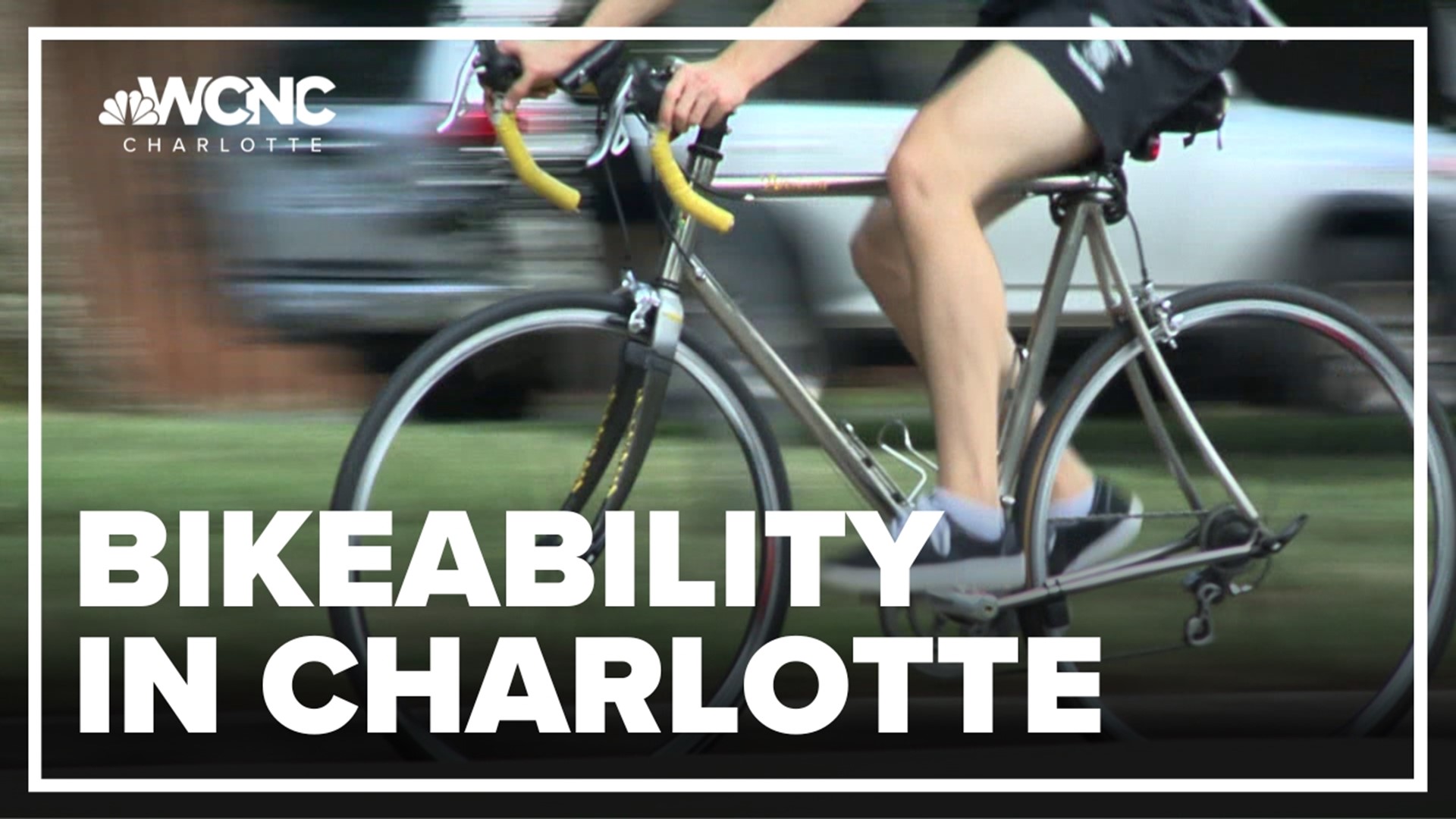CHARLOTTE, N.C. — Charlotte's bicycle infrastructure received a network score of 27 on a scale of 100 in the 2023 PeopleforBikes' City Ratings. The Queen City ranked 120 out of 163 in the large cities category of the rating.
PeopleforBikes releases these City Ratings scores to measure the quality of a city's protected bike lanes, off-street paths, slow share streets and safe crossings. High scores signify better accessibility in a community. The score considers how easy or difficult it is for people to cycle to different areas in their community, including hospitals, major transit hubs, shopping centers and work.
Charlotte's two lowest scores were in transit and core services, which include places like hospitals and grocery stores. While 27 is a low score, it's an improvement from Charlotte's 2017 rating of 20.
"We are making progress," Eric Zaverl, urban design specialist for Sustain Charlotte said. "I believe we've been ranked lower... But a lot of our peer cities are twice the score that we have or at least a little above us."
The transit accessibility score for Minneapolis, Minnesota, ranked 18 in the large cities category and tripled Charlotte's score.
Denver, Colorado, received a network score of 42 and ranked 79 in the large city category.
Charlotte can improve its safety and accessibility by changing high-stress streets into low-stress streets, Zaverl said. Low-stress streets are areas where people of all ages and abilities can cycle and worry less about intersections and passing cars.
"A high-stress area would be the complete opposite," Zaverl said. "You are constantly keeping your eyes open. You would be looking front, backside and every which way to make sure your life wasn't in danger."
Dread Fiyah, an avid bicyclist in the community and co-owner of The Spoke Easy, told WCNC Charlotte he has seen Charlotte's "bikeability" come a long way in the last 20 years but it's still unsafe.
"You really take your life in your own hands out there, especially on an unprotected street," Fiyah said.
Sadly, a life was taken earlier this year. Kristie Crowder, 30, was biking near The Plaza when she was struck by a car and died from her injuries in January. According to NCDOT, 16 to 20 bicyclists are killed in car crashes statewide each year, and many more are seriously injured.
"I’ve lived here for 23 years and I’ve been hit four times," Fiyah shared.
One of the hazards for bicyclists is a lack of connectivity within bike lanes. The city is working to change that with its Uptown CycleLink program. The project is bringing more protected bike lanes to Uptown and connecting them to greenways to help separate cyclists from cars.
ALSO ON WCNC CHARLOTTE: Brandywine-to-Tyvola greenway segment is finished
Plus, funding in the city’s budget this year will add 11 miles of new bike lanes in the city. However, some drivers would rather see city money spent on improving traffic flow.
"The cyclists are literally not in the bike lane whatsoever," Wes Kennington told WCNC Charlotte while in Uptown. "They're on the parts of the roads that vehicles are supposed to be."
While Kennington said he doesn’t see the bike lanes used often, Fiyah argued creating safer, trustworthy lanes will lead to more people opting to bike instead of drive, which could help reduce congestion and hazards on the road.
The study provides multiple ways to improve the City Ratings score that includes widening sidewalks and building protected intersections.
Contact Julia Kauffman at jkauffman@wcnc.com and follow her on Facebook, Twitter and Instagram.

